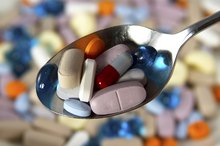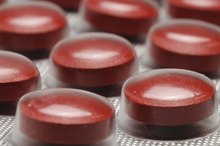Do Iron Supplements Affect Your Appetite?
Iron deficiency leads to a number of disorders, including anemia, cardiac issues, cold sores, fertility problems and restless leg syndrome. People with iron-poor diets, including vegetarians, risk iron deficiency, as do patients who experience excessive blood loss, This category includes women with heavy periods, people who have recently had surgery, and people afflicted with ulcers and other serious digestive issues. Iron supplements help correct your body's deficiency in the mineral. Iron supplements may improve appetite for people with anemia, while in other patients it can indirectly cause an increase or decrease in the desire to eat.
Anemia and Appetite
The most dramatic way in which iron pills may affect the appetite is by improving the condition known as iron deficiency anemia. As the condition's name indicates, iron deficiency anemia affects people who do not take in or retain enough of the crucial mineral. One symptom of this type of anemia is poor appetite. Lack of desire to eat may indicate anemia, especially in babies and children, MayoClinic.com notes. Children may start out life with an iron deficiency because their mothers remain unaware of the risk of anemia to themselves and their developing fetuses or they may simply not have access to iron supplements. If children fail to eat properly, their mental and physical growth becomes hampered.
Adding Iron for Anemia
Most Recommended Food for Anemic Children
Learn More
Adding iron supplements can help improve appetite, and in turn encourage healthy growth patterns, in children with iron deficiency anemia. A 1994 study of Kenyan school children found that taking iron supplements in the form of ferrous sulfate for 14 weeks measurably improved both growth and appetite in the children. For most pregnant women, iron supplements are needed because not enough of the mineral they need is provided in a regular meal plan.
Dosage
Recommended dosages for people with low iron or iron deficiency anemia varies, depending on age, gender, diet and severity of the deficiency. A physician can give you the best advise about the type of iron supplement and the dosage for you or your child. In general, children under 13 should not get more than 40 milligrams per day of iron from pills and foods, and adults should not exceed 45 daily milligrams. People with severe deficiencies may be prescribed more. On the other end of the spectrum, seniors should use extreme caution with iron pills. Poor iron intake rarely crops up as an issue with seniors, who do not need more than 8 milligrams of iron per day -- which they can usually achieve through diet. The elderly are at risk of organ damage or death from taking iron supplements.
General Appetite Concerns
Iron Supplements & Levothyroxine
Learn More
Except in cases of anemia, iron supplements are not known for causing an increase or decrease of the appetite -- at least as a primary symptom. If you have a loss of appetite, but one that doesn't spring from a primary problem like nausea or cramps, iron is unlikely to be the cause. Similarly, no significant reports of appetite stimulation come from iron supplements, other than for patients with anemia.
Primary Causes of Appetite Problems
Aside from iron deficiency anemia, other health problems or medications can change eating patterns. Illnesses such as cancer and liver disease, dementia and depression, as well as drugs such as amphetamines, morphine and codeine, all carry the risk of appetite loss. Gland disorders, anxiety and unusual amounts of activity, in addition to drugs such as anti-depressants and corticosteroids, can all lead to an increased appetite.
Appetite-Related Side Effects
Some primary side effects associated with iron intake can certainly have an effect on your appetite. This is especially true for a lowered appetite, and for potential weight loss. Iron supplements may cause nausea, vomiting, headaches, stomach cramps and diarrhea -- all of which can make you less inclined to eat, or may cause you to lose weight.
Recommendations
People who take iron on an empty stomach may experience nausea, headaches and stomach cramps, which can reduce your desire to eat. Ask your doctor if she recommends ingesting iron supplements with food. If so, take the iron with meals that don't contain cereal, coffee, tea or dairy, for you best chance at avoiding common side effects. Your doctor may also recommend controlled release supplements, or enteric-coated supplements, which in some people reduce side effects.
Considerations
While taking iron supplements with meals can help minimize the side effects that lead to unwanted weight loss and appetite issues, the interaction of food and iron can also decrease iron absorption. The same holds true with supplements designed to reduce side effects, such as enteric-coated or slow-release iron pills. If you definitely need more iron but experience problems such as nausea or cramping after taking the pills, take iron pills during meals, along with vitamin C. Whether in the form of another supplement or C-rich foods like citrus and tomatoes, vitamin C boosts the amount of iron your body absorbs.
Related Articles
References
- U.S. National Library of Medicine: Iron Supplements
- MayoClinic.com: Iron Supplement (Oral Route, Parenteral Route)
- U.S. National Library of Medicine: Appetite -- Decreased
- University of Maryland Medical Center: Appetite -- Increased
- Mayo Clinic: Iron Deficiency Anemia
- Journal of Nutrition: Iron Supplementation Improves Appetite and Growth in Anemic Kenyan Primary School Children
- Social Science & Medicine: Women's Perceptions of Iron Deficiency and Anemia Prevention and Control in Eight Developing Countries
- MedLine Plus: Iron Deficiency Anemia
- The Encyclopedia of Elder Care; Joseph Kandel, Christine Adamec
Writer Bio
Ellen Douglas has written on food, gardening, education and the arts since 1992. Douglas has worked as a staff reporter for the Lakeville Journal newspaper group. Previously, she served as a communication specialist in the nonprofit field. She received her Bachelor of Arts from the University of Connecticut.









